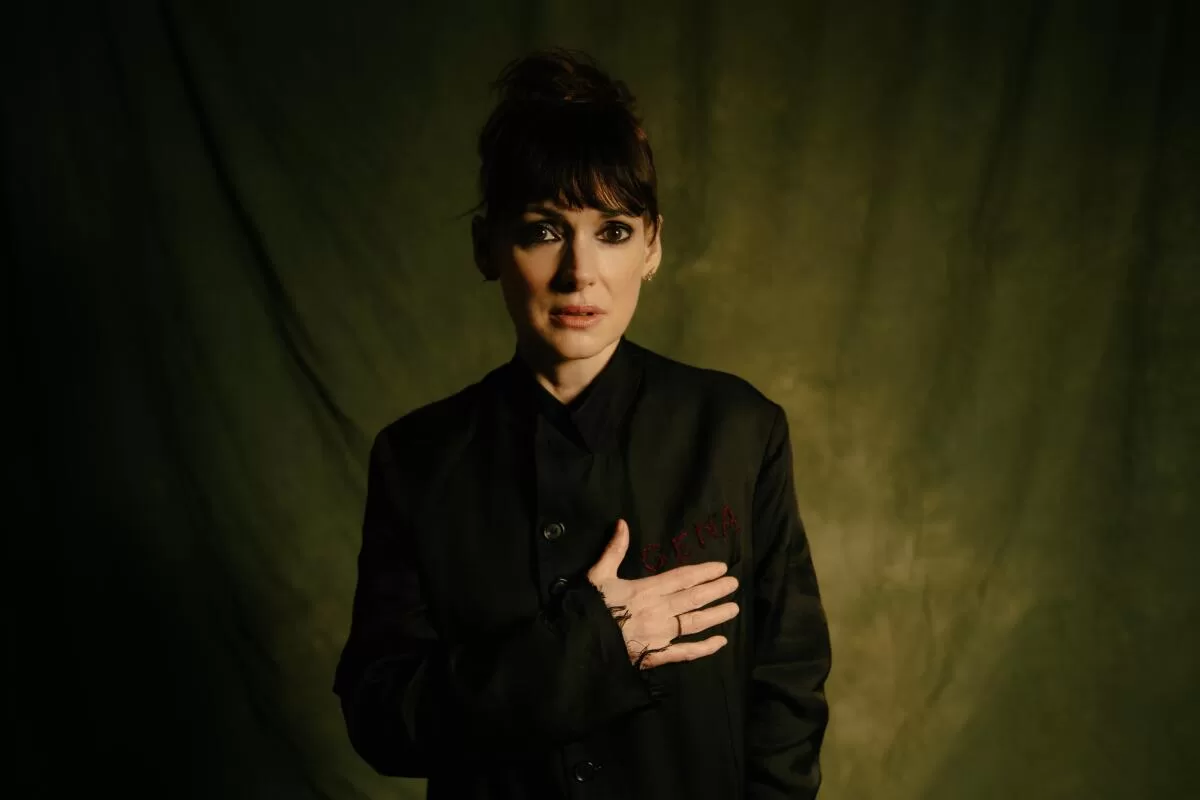Hello! I’m Mark Olsen. Welcome to another edition of your regular field guide to a world of Only Good Movies.
The fall festival season began in earnest this week with the opening of both the Venice and Telluride film festivals. Venice launched with the premiere of Tim Burton’s “Beetlejuice Beetlejuice,” the sequel to his 1988 comedy. Jenna Ortega joins the cast as the daughter of Winona Ryder’s Lydia Deetz, and Michael Keaton returns as the demonic trickster.
Esther Zuckerman interviewed Ryder, who has recently seen a career revival thanks to her role on “Stranger Things.” Ryder was somewhat preoccupied by the death of Gena Rowlands, her costar in Jim Jarmusch’s 1991 “Night on Earth,” who had died recently. Ryder even sewed “Gena” onto the jacket she was wearing for our interview, right over her heart.
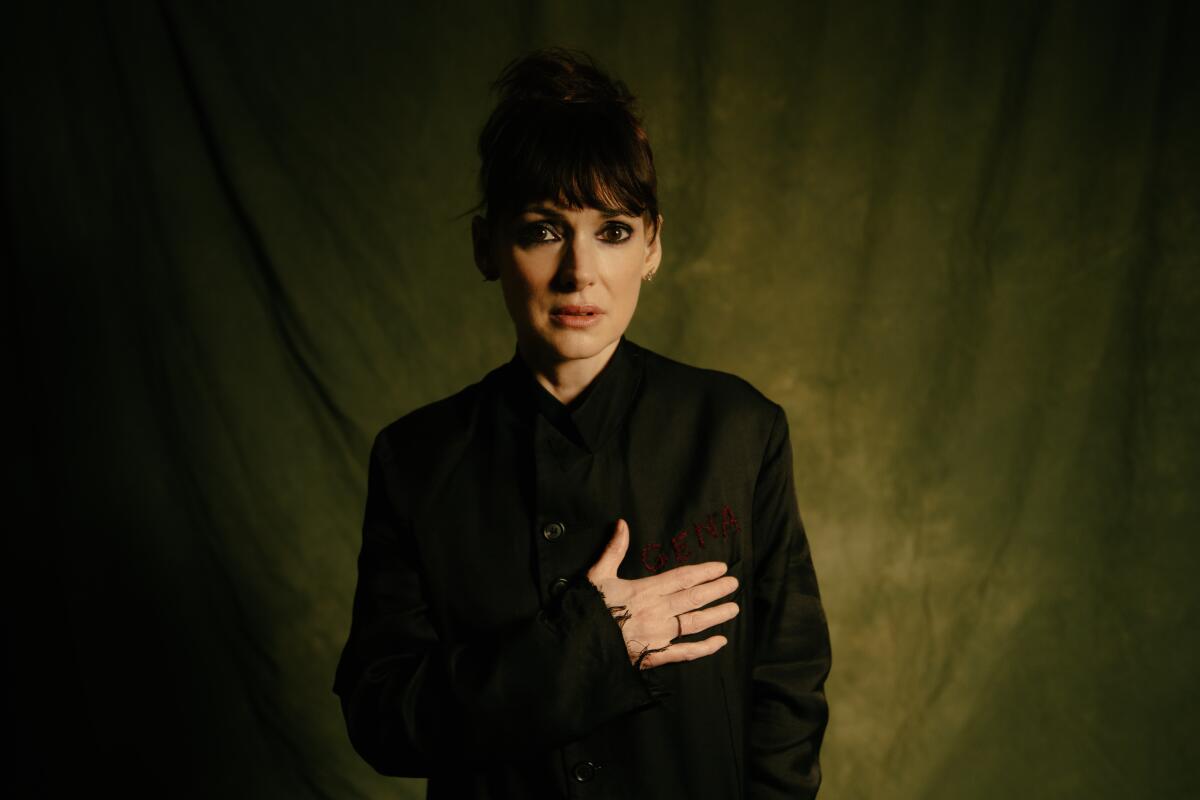
Winona Ryder, photographed in New York in August.
(Jennifer McCord / For The Times)
Ryder spoke glowingly of Ortega, in part because of the younger performer’s own film fandom. Ryder expressed concern that some of her cast mates on “Stranger Things” do not share the same passion.
“I don’t mean to sound so hopeless,” Ryder said. “There are a few that are just not interested in movies. Like, the first thing they say is, ‘How long is it?’ ”
Josh Rottenberg spoke to Telluride chief Julie Huntsinger about this year’s lineup, which includes the world premieres of Edward Berger’s papal thriller “Conclave,” RaMell Ross’ adaptation of Colson Whitehead’s novel “Nickel Boys” and Jason Reitman’s “Saturday Night,” about the first episode of “Saturday Night Live.”
Among films with political themes is Matt Tyrnauer’s biographical documentary “Carville: Winning Is Everything, Stupid!” on the Democratic strategist James Carville; and Errol Morris’ “Separated,” about the Trump administration’s family separation policies.
Hunsinger spoke about how this year’s slate of films reflects a positive future for cinema despite upheaval in the movie industry and the culture at large.
“All across the board, there are so many movies that are entertaining and smart that I feel very heartened,” she says. “Yes, there’s great tumult right now and things are so fractured and consensus is hard to come by. But all of us who come to Telluride have an obligation as ambassadors to try to get people to go to a cinema.”
Next week, I will be part of The Times team at the Toronto International Film Festival, with even more movies to be unveiled.
A 12-film tribute to Gena Rowlands
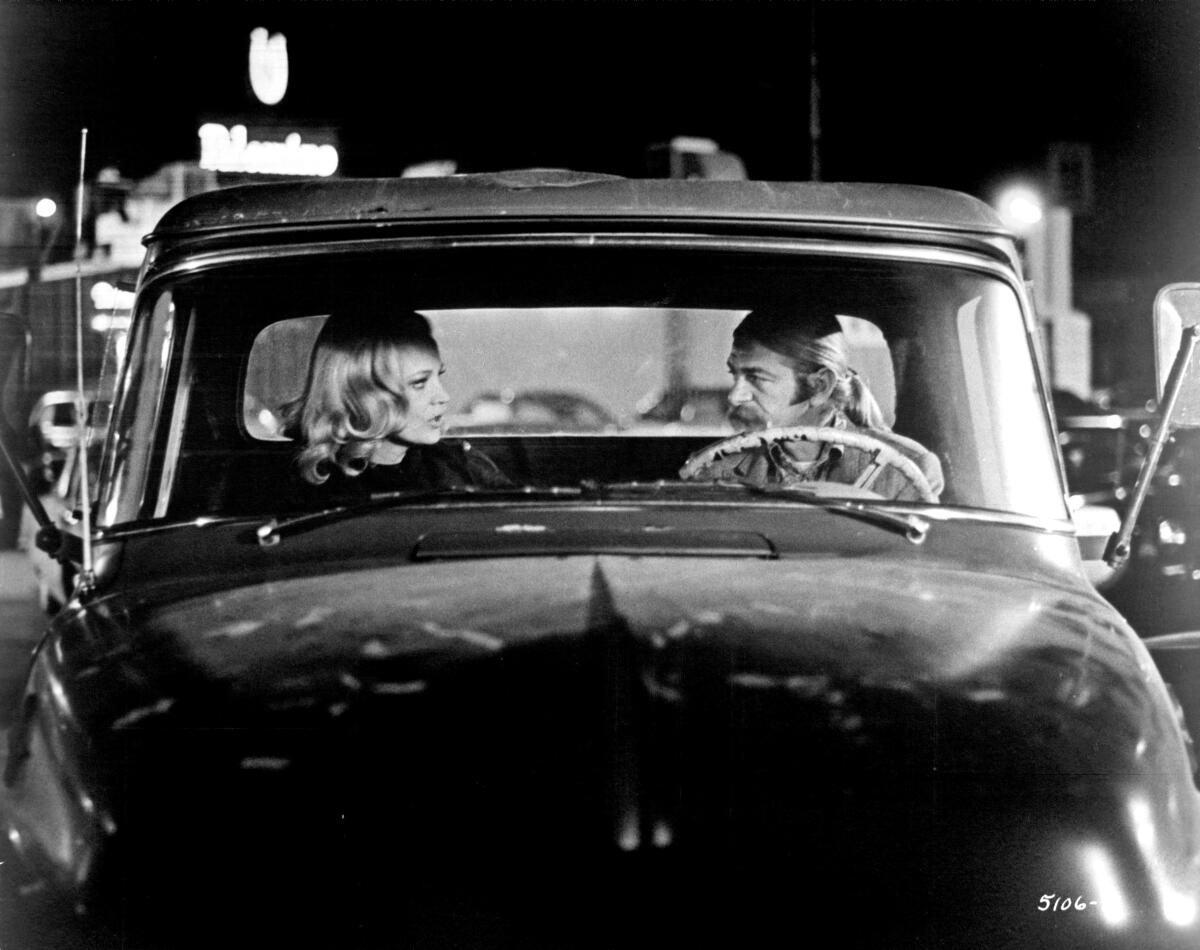
Gena Rowlands and Seymour Cassel on the set of the movie “Minnie and Moskowitz “ in 1971.
(Michael Ochs Archives / Getty Images)
If it seems like Gena Rowlands has been coming up a lot around here over the last few weeks, you would be correct. It has been a small solace since her death to see the outpouring of respect and affection for her groundbreaking work. The American Cinematheque has pulled together a 12-film tribute that pushes beyond just the work Rowlands did with her husband, actor and filmmaker John Cassavetes. (Though there is plenty of that too.)
Friday night at the Aero there will be a 35mm screening of 2004’s “The Notebook,” which introduced Rowlands to a new generation. In the romantic drama directed by her son Nick Cassavetes, Rowlands stars opposite James Garner as older versions of characters played by Rachel McAdams and Ryan Gosling.
On Saturday at the Egyptian, there will be a screening of John Cassavetes’ 1980 “Gloria,” which subverts many tropes of the gangster film as Rowlands plays a woman forced to protect a young boy.
In his original review, Charles Champlin wrote, “In ‘Gloria,’ Cassavetes has made the most startlingly accessible and likeable film of his career, linked to the earlier work mostly by the authenticity of its settings and the by the radiant skills of Gena Rowlands. … This is unmistakably a Cassavetes film. It is one intended to be taken unseriously, like Graham Greene’s entertainments. It reflects darker matters and it has a resonance and a density not entirely casual. It also has the splendid Gena Rowlands, which is all a lot of us will need to know.”
On Saturday there will also be a 35mm screening of Jim Jarmusch’s “Night on Earth,” a series of vignettes involving cab rides around the world. In one charming interlude set in Los Angeles, Ryder plays a driver who picks up Rowlands, a sharp Hollywood casting agent who knows someone special when she sees them.
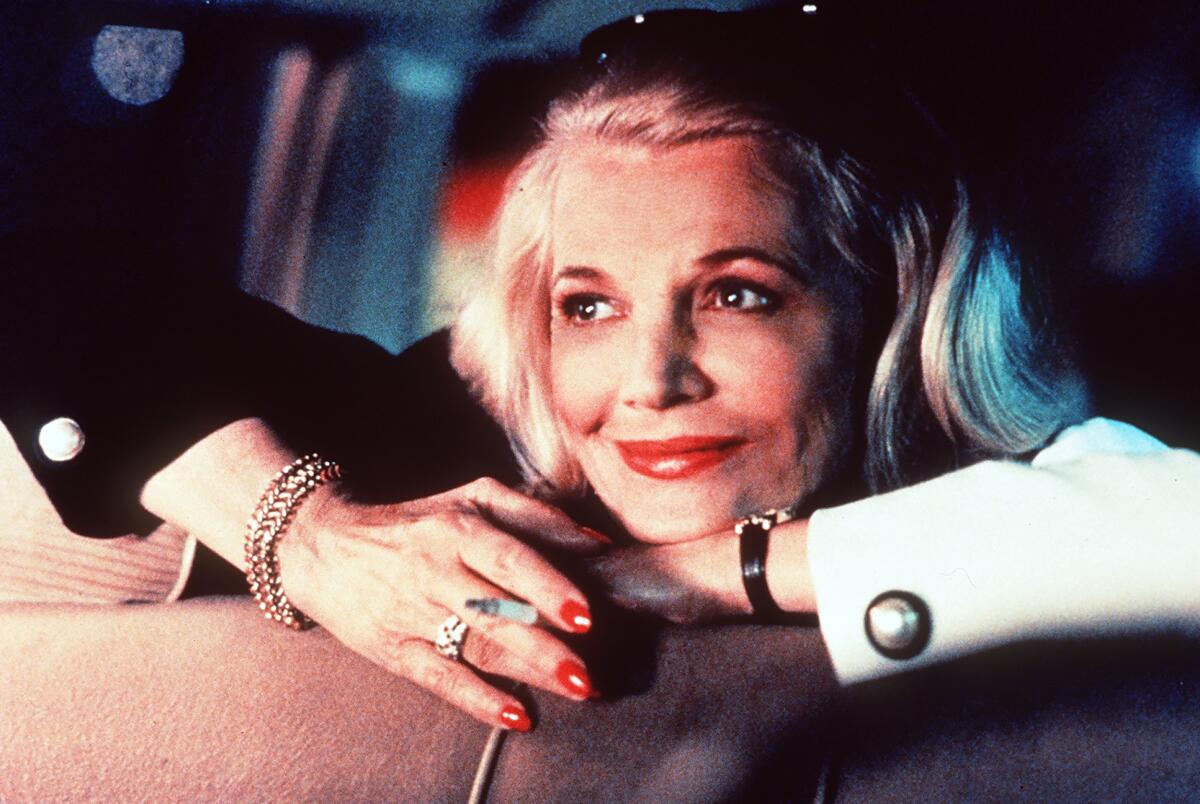
Gena Rowlands in Jim Jarmusch’s “Night on Earth.”
(Mark Higashino / Fine Line Features)
Other films in the series include a 35mm screening of 2007’s “Broken English,” starring Parker Posey as Rowlands’ daughter in a story directed by one of Rowlands’ actual daughters, Zoe Cassavetes. One of the more notable rarities in the series, Paul Schrader’s 1987 “Light of Day” (also screening in 35mm) sees Rowlands playing mother to Michael J. Fox and Joan Jett as a brother-sister duo of aspiring rock-and-rollers.
In his original review of the film, Michael Wilmington noted, “It’s Gena Rowlands who supplies most of the spontaneity. She gives her scenes fire and force, resonant humanity. Rowlands gets her great scene here — one so powerful and stunning it almost redeems the entire movie — from the kind of situation you’d think would make you groan: the mother’s deathbed blessing to her errant daughter.”
Another highlight of the series will be a screening of John Cassavetes’ 1971 romantic fable “Minnie and Moskowitz,” in which Rowlands and Seymour Cassel play a mismatched couple. (The recent “Between the Temples” purposely drew from the poster for “Minnie” for its own one-sheet.)
As Charles Champlin wrote at the time, “Miss Rowlands is plain marvelous, the apotheosis of the career girl who waits and waits, like a princess self-condemned to the tower.”
Jokermen on ‘The T.A.M.I. Show’
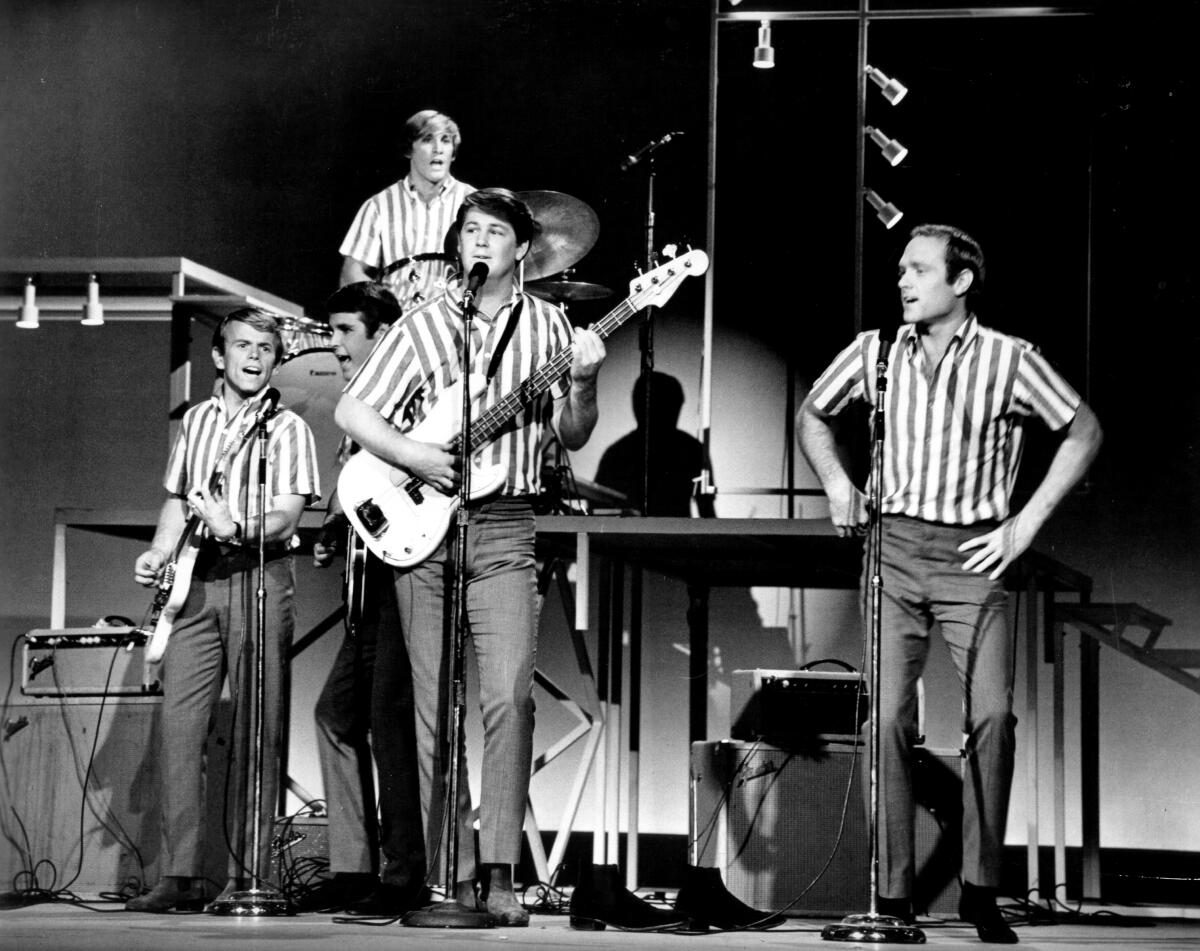
The Beach Boys perform at the T.A.M.I. Show in October 1964.
(Michael Ochs Archives / Getty Images)
Mezzanine will hold a screening of “The T.A.M.I Show” on 16mm on Thursday, presented by Evan Laffer and Ian Grant of the podcast “Jokermen.” (Dedicated readers will recall “Jokermen” hosted a screening of the Bob Dylan film “Masked and Anonymous” last year.)
Directed by Steve Binder, who would helm Elvis Presley’s 1968 comeback special a few years later, “The T.A.M.I. Show” captures the Teen Age Music International Show, which took place over two nights at the Santa Monica Civic Auditorium in 1964. Featured acts include the Beach Boys, the Rolling Stones, Marvin Gaye, the Supremes, Leslie Gore and a rightly legendary showstopping performance by James Brown.
“ ‘The T.A.M.I. Show’ is an extraordinary snapshot of an inflection moment in music culture, documenting the transition from ‘rock and roll’ to ‘rock’ that occurred in the mid-sixties,” said Grant in an email. “Chuck Berry kicks off the film with hotrod chutzpah, but by the time it concludes with a jittery, menacing performance from the Rolling Stones, we’re in entirely new era. Rock has won, and there’s no going back.”
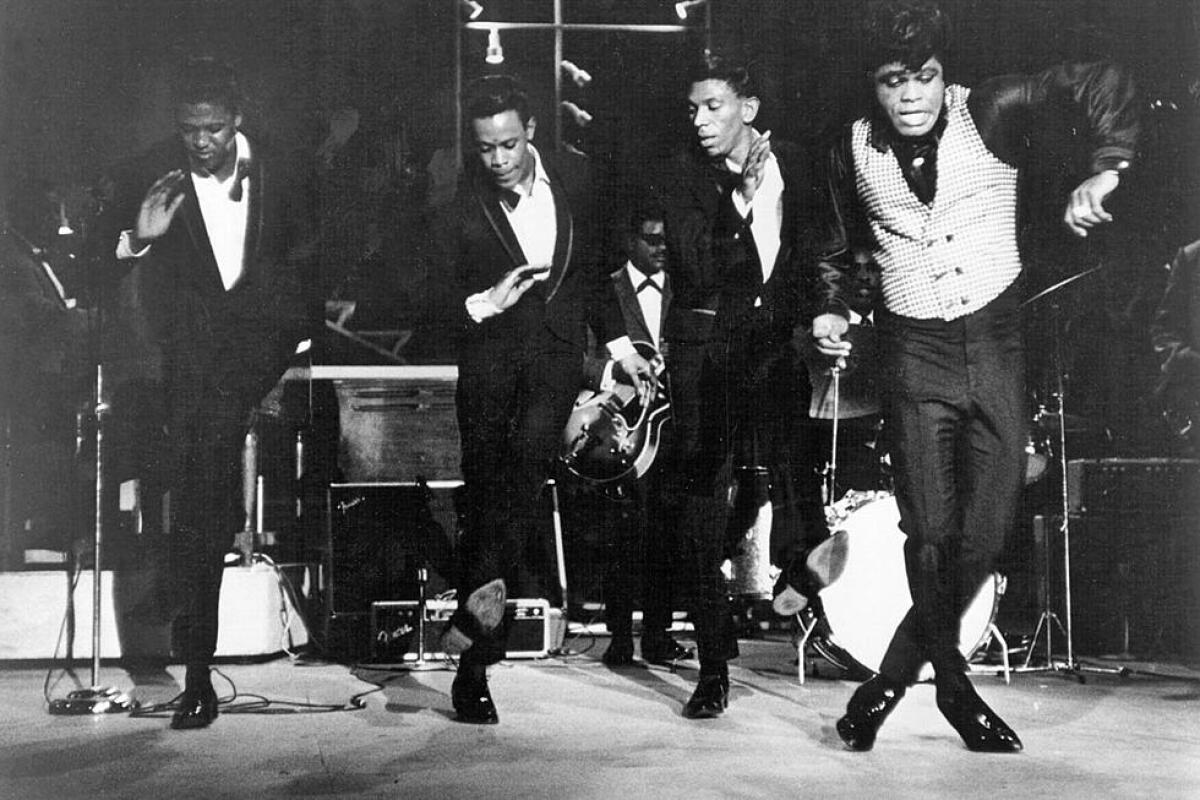
James Brown, right, performs in “The T.A.M.I. Show.”
(Mezzanine)
“Jokermen” is in the middle of a series of episodes chronicling the career of the Beach Boys, so they take special interest in the group’s performance as part of the show.
“They’re part of the new wave, but their songs straddle the line between the simple pleasures of rock and roll and the darker, consciously artistic aims of rock, “ said Grant. “Brian Wilson is still just a kid from the South Bay wearing a striped shirt. … This film is an invaluable document of this first iteration of the band: guys who couldn’t surf singing songs about surfing.”
Added Laffer, “The film is of course an important historical document, but beyond that, ‘The T.A.M.I. Show’ is like a focused beam of the life force that powers culture. Young people may not scream like that for this music anymore, but that energy still exists in the world. It’s a reminder of what it looks and sounds like in its purest form. I think if this music had existed in the dark ages, it would have caught on with teenagers in the dark ages. But it happened in 1964.”
Points of interest
‘Heathers’
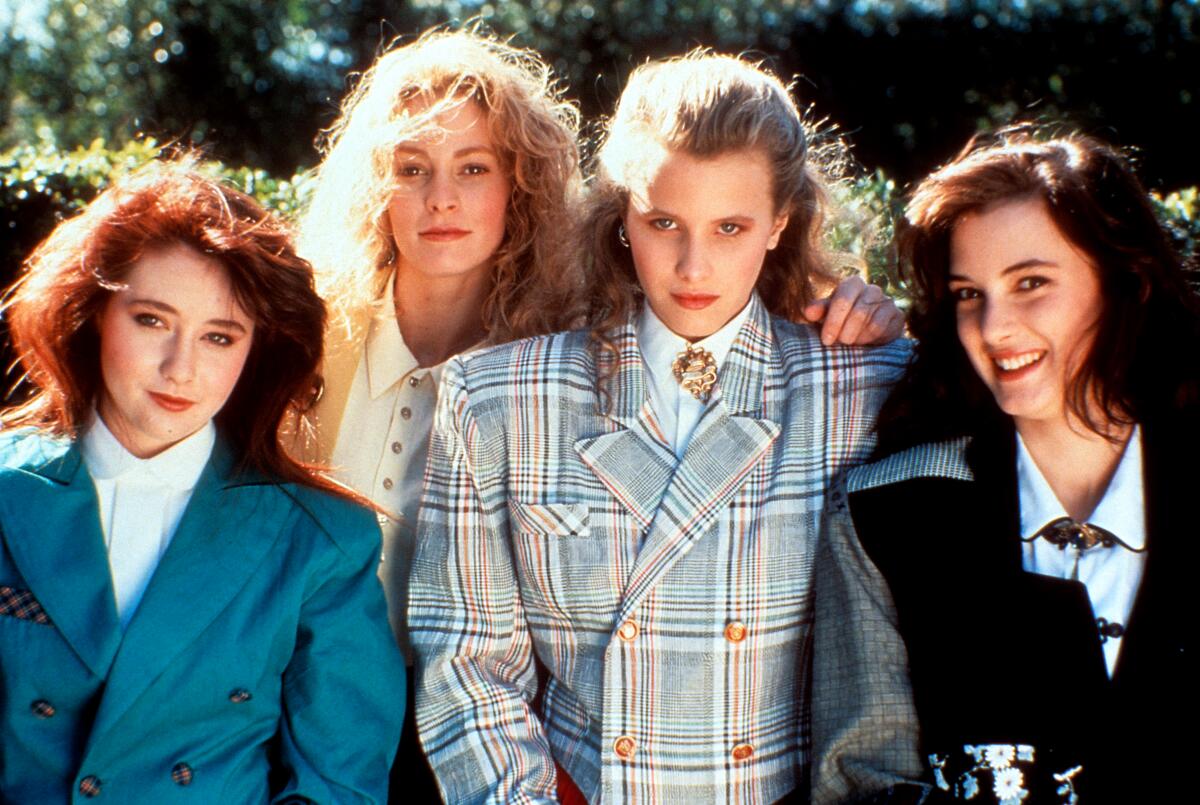
Shannen Doherty, left, Lisanne Falk, Kim Walker and Winona Ryder on the set of the film “Heathers” in 1988.
(New World Pictures / Getty Images)
Speaking of Winona Ryder, Vidiots will play a 35th anniversary screening of “Heathers” on Sunday with director Michael Lehman, screenwriter Daniel Waters and actor Lisanne Falk (who played one of the members of the social clique from the film’s title) all in attendance.
The subversive satire of teenage life depicts four Ohio teenagers, including Ryder’s Veronica Sawyer and three girls named Heather, one played by Shannon Doherty, who find their lives disrupted by the arrival of a mysterious outsider, played by Christian Slater.
Times critic Sheila Benson was unsparing in her disdain for the film, noting, “No amount of production sheen or acting skill seems excuse enough for the film’s scabrous morality or its unprincipled viciousness.”
In a delightful profile of Ryder from the same time, which includes driving around with writer Patrick Goldstein looking for an abandoned house to hang out in, the then 17-year-old actor showed her savvy by saying, “I read all the bad things your critic said. I thought it was great. It’s exactly the kind of review that would make you run out and see the movie.”
Ryder defended the film by saying, “The film is obviously exaggerated, but I think it rings true. And anyway — isn’t that the whole concept of being a teenager? It’s a time when everything in your life is exaggerated — every emotion, every event.”
Also in the news
Surprise guests at ‘Showgirls’ and ‘Miami Vice’
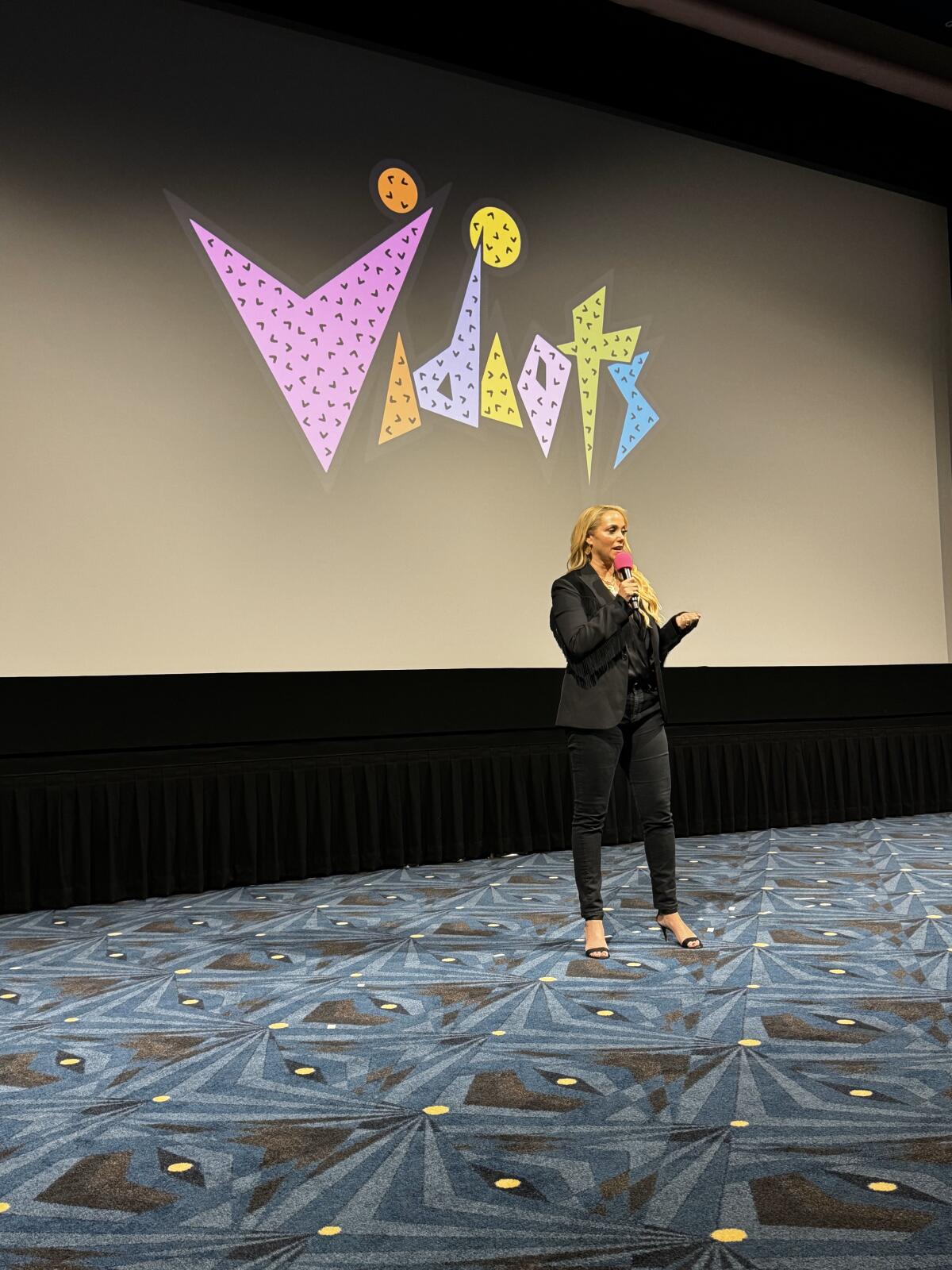
Elizabeth Berkley at a screening of “Showgirls” at Vidiots in August.
(Vidiots Foundation)
This past weekend, two events confirmed for me the very premise of this column, as film screenings turned into revelatory events with surprises that rewarded the act of leaving the house.
On Friday at Vidiots, a 35mm screening of Paul Verhoeven’s “Showgirls” featured Max Minghella previewing his own next film and unannounced introductions from Kristen Stewart and Elizabeth Berkley, star of the evening’s film.
At the Egyptian Theatre on Saturday, filmmaker Michael Mann was a surprise guest on hand to speak about his 2006 movie “Miami Vice” following a 35mm screening.
Minghella had been announced as introducing the Vidiots screening of “Showgirls” but he also presented the opening scene from his upcoming film “Shell,” which is having its world premiere at next week’s Toronto International Film Festival and features Berkley in a small role.
Then Stewart, who along with director Rose Glass spoke about the influence of “Showgirls” while promoting “Love Lies Bleeding” earlier this year, came out to extoll the virtues of the film and Berkley’s performance. A notorious flop when it was first released, Berkely saw her career derailed for many years by the response to the film, in which she plays Nomi Malone, an ambitious dancer in Las Vegas.
“How can you even know what this movie has done for everyone?” Stewart said of Berkley’s performance and the film’s reclamation as an empowerment anthem.
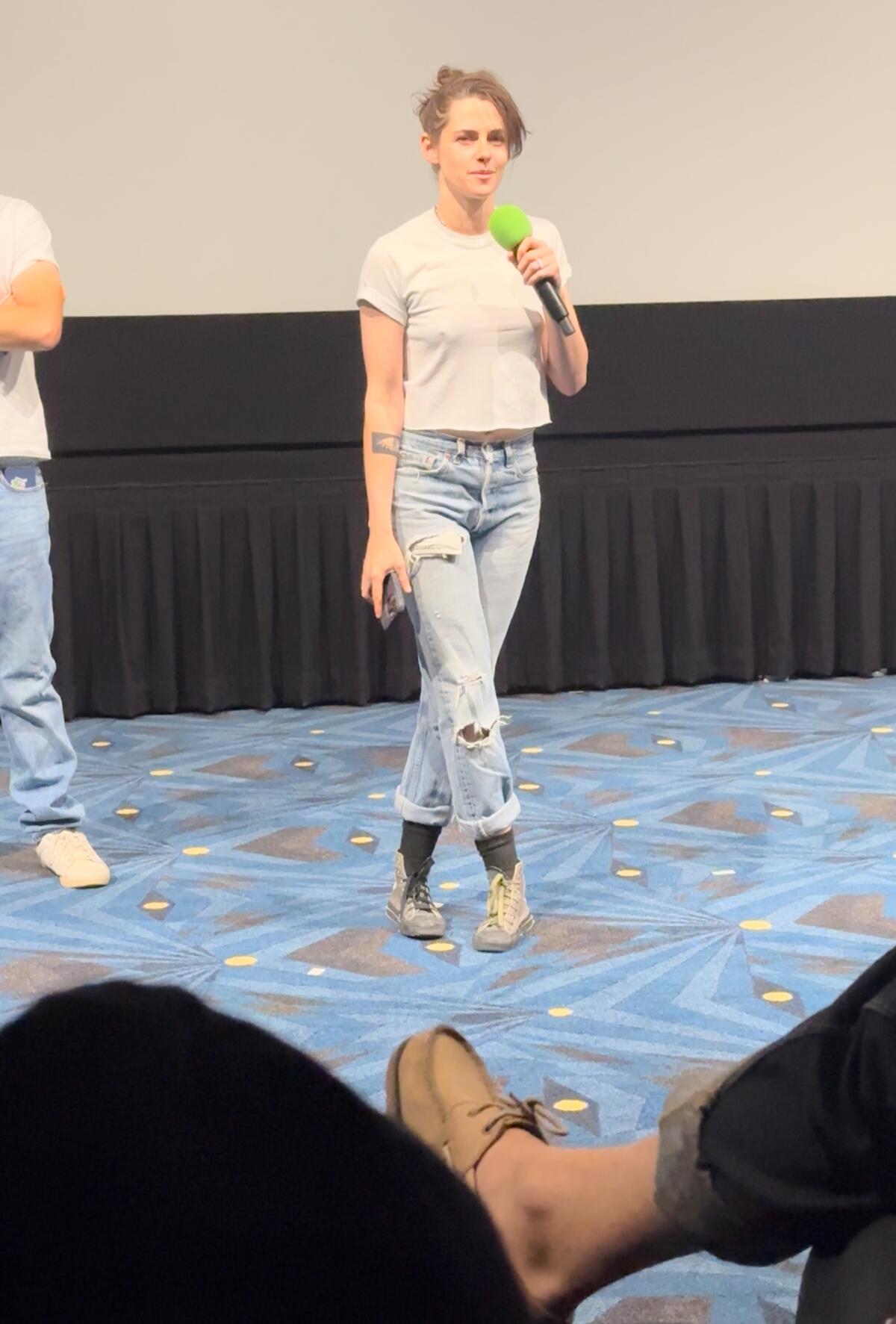
Kristen Stewart introduces a screening of “Showgirls” at Vidiots.
(Vidiots Foundation)
“Imagine being the girl that thrusted that f— hard in the movie,” said Stewart in reference to one of Berkley’s more notorious scenes. “And not having any homies to be like, ‘You’re right. Every decision that you have made is the right one and you’re the best thing about this movie. And yes, it was somebody else’s idea, but you’re the reason it has lived.”
Stewart added, “The nights that we’ve gone too hard and gone home and had doubt — ‘Maybe I shouldn’t have, maybe I should never have been anything.’ — this movie f— barrels through that.”
Then Berkley came out to a riotous ovation from the crowd.
“If my 21-year-old self had known that this would be possible at any point in my life, that people would continue gathering and enjoying and drawing inspiration from this,” Berkley said, “whether it’s entertainment to you or rite-of-passage or permission to be your most authentic self, whatever you draw from Nomi and this movie, I would hope it gives you exactly what you need.”
She addressed Stewart when she said, “Kristen, that was such a surprise and so beautiful, from an actress who is so bold. You are so bold in your work, fearless, vulnerable. And I didn’t have women at the time when this movie came out championing me in any way. It was a very lonely time when it first came out.
“Think about the ’90s, we didn’t have that support,” Berkely added. “It didn’t make any sense to me because I grew up when women had each other’s backs. So it was a very strange, isolating time. So again, my 21-year-old self, to have an introduction like that in the form that is you is very healing.”
Berkely added, “I didn’t go to film school, I went to Vidiots,” noting that before she first met with Dutch-born director Verhoeven, she rented his international films from the original Vidiots location in Santa Monica.
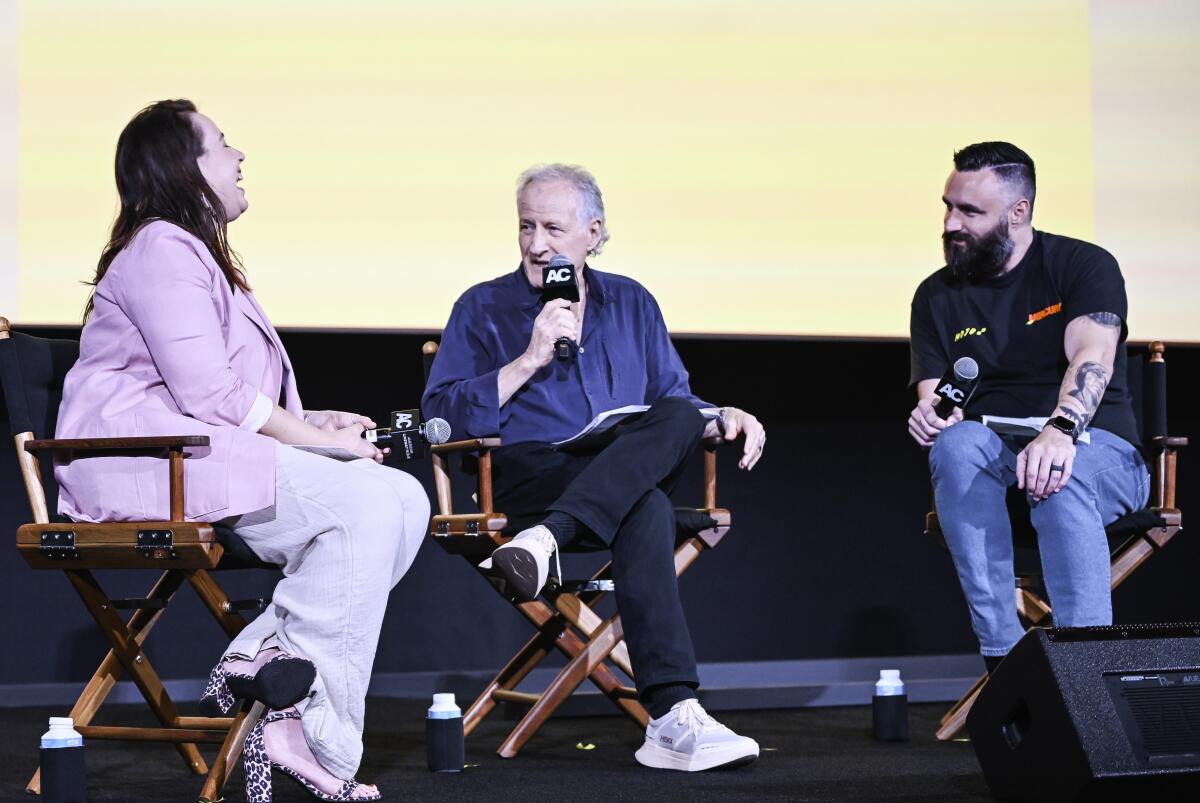
Katie Walsh, left, Michael Mann and Blake Howard discuss “Miami Vice” at the Egyptian Theatre in August.
(Cynthia “Cyndee” Arroyo for American Cinematheque)
On Saturday, as part of the American Cinematheque’s second “Friend of the Fest” series, in which podcasters select films, “Miami Vice” was screened at the Egyptian, selected by Blake Howard and Katie Walsh, hosts of the show “Miami Nice,” which is dedicated to the film.
Introducing the movie, they implored the audience to stay afterward for a surprise. When writer-director-producer Mann was introduced once the film had finished, the audience lost its collective mind.
The film has become a fan favorite arguably second only to Mann’s “Heat,” as people have locked into the movie’s moody romanticism and inventive visual style in its telling of a pair of Miami undercover cops played by Colin Farrell and Jamie Foxx.
Mann said the romantic storyline with Farrell’s character falling for a drug kingpin’s financial advisor played by Gong Li was based on an undercover DEA agent Mann actually knew, who was on an operation to catch money launderers in Hong Kong and fell in love with the sister of his target.
“And that’s supposed to never happen,” Mann said matter-of-factly to a great response from the audience before adding that the agent would eventually be indicted and then walk in front of an 18-wheeler as a character played by John Hawkes does in the film.
Mann added, “But that romantic, transcendent, ephemeral conviction that I’ve met somebody and this is the love of my life and I want nothing more than to be with them, to sacrifice everything. And yes, I’ve lost the sense of which way is up. And there’s no red lights, there’s no green lights, there’s no traffic lights. I’m just going through this. So that’s very much the heart of this thing for me.”
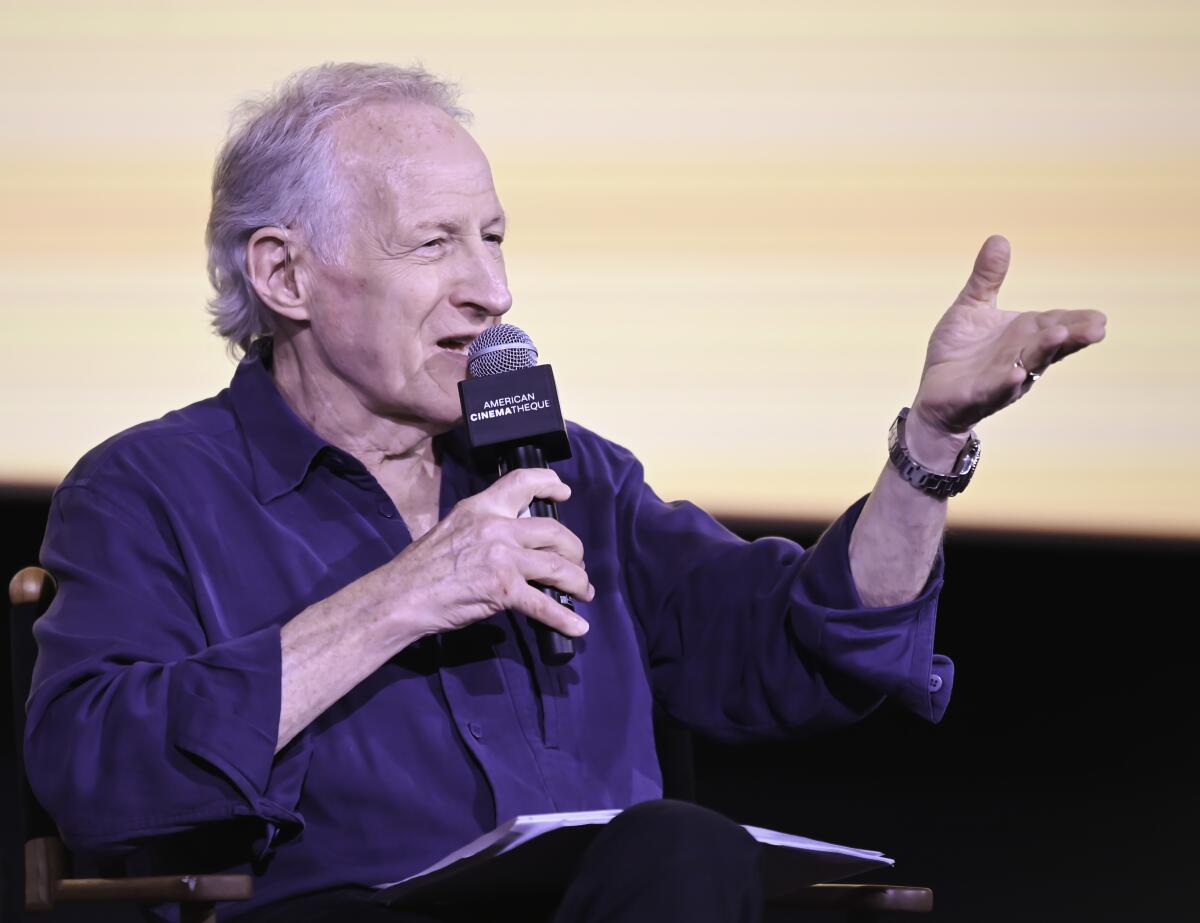
Filmmaker Michael Mann holds court after a screening of “Miami Vice” at the Egyptian.
(Cynthia “Cyndee” Arroyo for American Cinematheque)
While talking about the low-key comedy of a scene in which a criminal middleman played by Eddie Marsan is given a hard time by a team lead by Farrell and Foxx, Mann pointed out something serious in a moment when Farrell looks out a window at the water.
“My ambition for it was that you would sense that he’s looking for something,” Mann said. “That’s all, not what he’s looking for, it’s just that he’s looking for something, a sense of a man who’s introspective, an introspective moment, and he’s searching. That’s all. And I just wanted to set that up somehow, establish that vacuum that then Gong Li as Isabella fills. It’s kind of gratifying that people ask me about that shot. You never know if something’s going to actually communicate your intent or not. It’s gratifying because it did.
Walsh then noted that the heroes of a number of Mann’s films also like to look at the sea.
“That’s my own personal affliction,” Mann said. “When I’m trying to figure something out, I like to look at the sea.”
Mann also noted how as rehearsal the actors actually did practice runs through seafaring shipping lanes outside Miami at night as seen in the film and that Farrell received smuggled drugs at an undercover DEA storefront operation.
“If you want to really capture the intensity of what it is to do this kind of work, when you put yourself in a real situation, it’s a fabulous thing to do,” Mann said. “It’s so detailed, it’s so specific and has so many edges to it. I’m a big believer in doing that kind of work with the actors and it becomes an adventure for us.”
